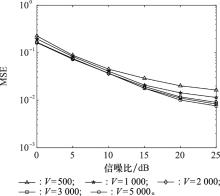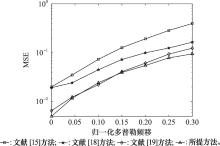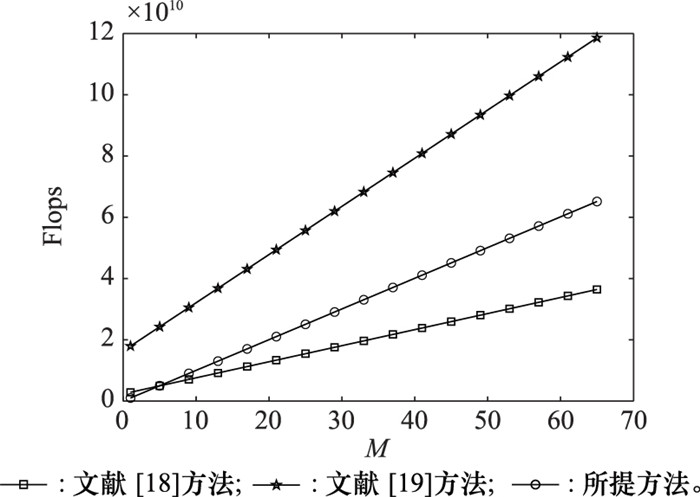Systems Engineering and Electronics ›› 2025, Vol. 47 ›› Issue (1): 324-331.doi: 10.12305/j.issn.1001-506X.2025.01.33
• Communications and Networks • Previous Articles Next Articles
Time-varying channel estimation in RIS-assisted OFDM system
Yongqi SHAO, Lihua YANG, Ao CHANG, Lulu REN
- 1. College of Communication and Information Engineering, Nanjing University of Posts and Telecommunications, Nanjing 210003, China
2. Jiangsu Key Laboratory of Wireless Communication, Nanjing 210003, China
-
Received:2023-06-29Online:2025-01-21Published:2025-01-25 -
Contact:Lihua YANG
CLC Number:
Cite this article
Yongqi SHAO, Lihua YANG, Ao CHANG, Lulu REN. Time-varying channel estimation in RIS-assisted OFDM system[J]. Systems Engineering and Electronics, 2025, 47(1): 324-331.
share this article
Table 2
Complexity of different channel estimation methods"
| 方法 | 阶段 | 复杂度 |
| 文献[ | 训练阶段 | V((2NMR1+R2R3+R3R4+R4R5+R52NM)+ 2NME+15E2+E2NM) |
| 估计阶段 | (2NMR1+R2R3+R3R4+R4R5+R52NM)+ 2NME+15E2+E2NM | |
| 文献[ | 训练阶段 | V((2NMD1+D1D2+D2D3+D3D4+D4D5+ D5D6+2D6NM)+(2NMR1+R1R2+R22NM)) |
| 估计阶段 | 2NMD1+D1D2+D2D3+D3D4+D4D5+ D5D6+2D6NM+2NMR1+R1R2+R22NM | |
| 所提方法 | 训练阶段 | V(2QLMC1+C1C2+C2C3+C3C4+C4C5+c) |
| 估计阶段 | 2QLMC1+C1C2+C2C3+C3C4+C4C5+c |
| 1 | ELMOSSALLAMY M , ZHANG H , SONG L , et al. Reconfi-gurable intelligent surfaces for wireless communications: principles, challenges, and opportunities[J]. IEEE Trans.on Communications, 2020, 6 (3): 990- 1002. |
| 2 |
ZHAO M M , LIU A , WAN Y B , et al. Two-timescale beamforming optimization for intelligent reflecting surface aided multiuser communication with qos constraints[J]. IEEE Trans.on Wireless Communications, 2021, 20 (9): 6179- 6194.
doi: 10.1109/TWC.2021.3072382 |
| 3 |
BASAR E , RENZO M , et al. Wireless communications through reconfigurable intelligent surfaces[J]. IEEE Access, 2019, 7, 116753- 116773.
doi: 10.1109/ACCESS.2019.2935192 |
| 4 |
RENZO M , ZAPPONE A , DEBBAH M , et al. Smart radio environments empowered by reconfigurable intelligent surfaces: how it works, state of research, and the road ahead[J]. IEEE Journal on Selected Areas in Communications, 2020, 38 (11): 2450- 2525.
doi: 10.1109/JSAC.2020.3007211 |
| 5 | HUANG C W , ZAPPONE A , ALEXANDROPOULOS G , et al. Reconfigurable intelligent surfaces for energy efficiency in wireless communication[J]. IEEE Trans.on Wireless Communications, 2018, 18 (8): 4157- 4170. |
| 6 | 刘怡伶. 面向6G的智能反射表面技术的研究探讨[J]. 新型工业化, 2022, 12 (11): 247- 250. |
| LIU Y L . Research on intelligent reflective surface technology for 6G[J]. New Industrialization, 2022, 12 (11): 247- 250. | |
| 7 | ZHANG H, SHLEZINGER N, ALAMZADEH I, et al. Channel estimation with simultaneous reflecting and sensing reconfi-gurable intelligent metasurfaces[C]//Proc. of the IEEE Signal Processing Advances in Wireless Communications, 2021: 536-540. |
| 8 |
HUANG C W , HU S , ALEXANDROPOULOS G , et al. Holographic MIMO surfaces for 6G wireless networks: opportunities, challenges, and trends[J]. IEEE Wireless Communications, 2020, 27 (5): 118- 125.
doi: 10.1109/MWC.001.1900534 |
| 9 |
LIU H , YUAN X J , ZHANG Y J . Matrix-calibration-based cascaded channel estimation for reconfigurable intelligent surface assisted multiuser MIMO[J]. IEEE Journal on Selected Areas in Communications, 2020, 38 (11): 2621- 2636.
doi: 10.1109/JSAC.2020.3007057 |
| 10 |
ZHENG B X , ZHANG R . Intelligent reflecting surface-enhanced OFDM: channel estimation and reflection optimization[J]. IEEE Wireless Communications Letters, 2020, 9 (4): 518- 522.
doi: 10.1109/LWC.2019.2961357 |
| 11 |
YOU C S , ZHENG B X , ZHANG R . Channel estimation and passive beamforming for intelligent reflecting surface: discrete phase shift and progressive refinement[J]. IEEE Journal on Selected Areas in Communications, 2020, 38 (11): 2604- 2620.
doi: 10.1109/JSAC.2020.3007056 |
| 12 |
WANG P L , FANG J , DUAN H P , et al. Compressed channel estimation for intelligent reflecting surface-assisted millimeter wave systems[J]. IEEE Signal Processing Letters, 2020, 27, 905- 909.
doi: 10.1109/LSP.2020.2998357 |
| 13 | HE J G, LEINONEN M, WYMEERSCH H, et al. Channel estimation for RIS-aided mmwave MIMO systems[C]//Proc. of the IEEE Global Communications Conference, 2020. |
| 14 |
WEI X H , SHEN D , DAI L L . Channel estimation for RIS assisted wireless communications-Part Ⅱ: an improved solution based on double-structured sparsity[J]. IEEE Communications Letters, 2021, 25 (5): 1403- 1407.
doi: 10.1109/LCOMM.2021.3052787 |
| 15 | MISHRA D, JOHANSSON H. Channel estimation and low-complexity beamforming design for passive intelligent surface assisted MISO wireless energy transfer[C]//Proc. of the IEEE International Conference on Acoustics, Speech and Signal Processing, 2019: 4659-4663. |
| 16 |
MAO Z D , PENG M G , LIU X Q . Channel estimation for reconfigurable intelligent surface assisted wireless communication systems in mobility scenarios[J]. China Communications, 2021, 18 (3): 29- 38.
doi: 10.23919/JCC.2021.03.003 |
| 17 |
SUN S , YAN H S . Channel estimation for reconfigurable intelligent surface-assisted wireless communications considering Doppler effect[J]. IEEE Wireless Communications Letters, 2021, 10 (4): 790- 794.
doi: 10.1109/LWC.2020.3044004 |
| 18 |
XU M , ZHANG S , MA J P , et al. Deep learning-based time-varying channel estimation for RIS assisted communication[J]. IEEE Communications Letters, 2022, 26 (1): 94- 98.
doi: 10.1109/LCOMM.2021.3127160 |
| 19 |
YU J D , LIU X L , GAO Y , et al. Deep learning for channel tracking in IRS-Assisted UAV communication systems[J]. IEEE Trans.on Wireless Communications, 2022, 21 (9): 7711- 7722.
doi: 10.1109/TWC.2022.3160517 |
| 20 | TANG Q, LONG H, YANG H J, et al. An enhanced LMMSE channel estimation under high speed railway scenarios[C]//Proc. of the IEEE International Conference on Communications Workshops, 2017: 999-1004. |
| 21 |
杨丽花, 任露露, 呼博, 等. 基于元学习的时变信道估计方法[J]. 系统工程与电子技术, 2023, 45 (6): 1872- 1879.
doi: 10.12305/j.issn.1001-506X.2023.06.32 |
|
YANG L H , REN L L , HU B , et al. Time-varying channel estimation method based on meta-learning[J]. Systems Engineering and Electronics, 2023, 45 (6): 1872- 1879.
doi: 10.12305/j.issn.1001-506X.2023.06.32 |
|
| 22 |
聂倩, 杨丽花, 呼博, 等. 基扩展模型下基于LSTM神经网络的时变信道预测方法[J]. 系统工程与电子技术, 2022, 44 (9): 2971- 2977.
doi: 10.12305/j.issn.1001-506X.2022.09.33 |
|
NIE Q , YANG L H , HU B , et al. Time-varying channel prediction method based on LSTM neural network under base extension model[J]. Systems Engineering and Electronics, 2022, 44 (9): 2971- 2977.
doi: 10.12305/j.issn.1001-506X.2022.09.33 |
|
| 23 | LIAO Y, SUN G D, SHEN X F, et al. BEM-based channel estimation and interpolation methods for doubly-selective OFDM channel[C]//Proc. of the IEEE International Conference, 2018: 70-75. |
| 24 | YANG H, XIONG J, LI S Y, et al. Wavelet BEM based channel estimation over rapidly time-varying channels[C]//Proc. of the IEEE Wireless Communications and Networking Conference Workshops, 2013: 71-75. |
| 25 | YANG S, WANG D D, LIU L Z, et al. BEM based fast time-varying channel estimation method for 5G integrated satellite systems[C]//Proc. of the IEEE International Conference on Communication Technology, 2022: 1020-1024. |
| 26 |
XU C , AN J C , BAI T , et al. Channel estimation for reconfi-gurable intelligent surface assisted high-mobility wireless systems[J]. IEEE Trans.on Vehicular Technology, 2023, 72 (1): 718- 734.
doi: 10.1109/TVT.2022.3203818 |
| 27 | ZHENG X, CHENG W C, WANG J Z. Position-aided on/off states judgment for 1-bit RIS assisted V2V mmwave communication[C]//Proc. of the IEEE Global Communications Confe-rence, 2022: 3211-3216. |
| 28 |
PAPAZAFEIROPOULOS A , PAN C , PANDELIS K , et al. Intelligent reflecting surface-assisted MU-MISO systems with imperfect hardware: channel estimation and beamforming design[J]. IEEE Trans.on Wireless Communications, 2022, 21 (3): 2077- 2092.
doi: 10.1109/TWC.2021.3109391 |
| 29 | 曹春阳, 胡诚. 基于卷积神经网络的单幅图像超分辨率重建算法综述[J]. 中国高新科技, 2022, 12, 105- 110. |
| CAO C Y , HU C . A review of super-resolution reconstruction of single image based on convolution neural networks[J]. China High-Tech, 2022, 12, 105- 110. | |
| 30 |
HUANG H J , YANG J , HUANG H , et al. Deep learning for super-resolution channel estimation and DOA estimation based massive MIMO system[J]. IEEE Trans.on Vehicular Techno-logy, 2018, 67 (9): 8549- 8560.
doi: 10.1109/TVT.2018.2851783 |
| 31 | WANG X Y, WANG G P, HE R S, et al. Uplink channel estimation with basis expansion model and expectation maximization for wireless communication systems on high-speed railways[C]//Proc. of the IEEE International Conference on Communication in China, 2017. |
| [1] | Fangzheng LIU, Ruiqi ZENG, Yang GONG, Zhenzhong HAN. ZC-OFDM-based radar interference integrated waveform design and processing method [J]. Systems Engineering and Electronics, 2024, 46(9): 2999-3011. |
| [2] | Gang TAN, Shefeng YAN, Zihao YE, Jirui YANG. Iterative impulsive noise mitigation and channel estimation method for OFDM system [J]. Systems Engineering and Electronics, 2024, 46(8): 2841-2849. |
| [3] | Gang ZHANG, Xi CHEN, Zhongjun JIANG. High-rate permutation index differential chaos shift keying communication system [J]. Systems Engineering and Electronics, 2024, 46(3): 1125-1133. |
| [4] | Bowen GU, Lin LI, Chuanjin DAI, Bo ZANG, Zhigang ZHU, Xiangpu LIU, Junlin TANG. Research on concealed positioning algorithm based on LEO satellites OFDM signal investigation and detection [J]. Systems Engineering and Electronics, 2024, 46(12): 3957-3964. |
| [5] | Lihua YANG, Lulu REN, Bo HU, Yongqi SHAO, Qian NIE. Meta-learning based time-varying channel estimation method [J]. Systems Engineering and Electronics, 2023, 45(6): 1872-1879. |
| [6] | Yan LYU, Fei CAO, Jianfeng XU, Xiaowei FENG. Robust beamforming algorithm for monostatic MIMO radar based on FRFT [J]. Systems Engineering and Electronics, 2023, 45(1): 79-85. |
| [7] | Jian DANG, Yewei LI, Yongdong ZHU, Rongbin GUO, Zaichen ZHANG, Liang WU. Progressive channel estimation method for RIS-assisted communication system [J]. Systems Engineering and Electronics, 2022, 44(3): 998-1006. |
| [8] | Jie ZHANG, Lihua YANG, Qian NIE. Novel time-varying channel prediction method based on stacked ELM [J]. Systems Engineering and Electronics, 2022, 44(2): 662-667. |
| [9] | Buhua LIU, Dan DING, Liu YANG, Naiyang XUE, Zhongqian LIU. OFDM data transmission technology of UAV based on deep neural network [J]. Systems Engineering and Electronics, 2022, 44(2): 696-702. |
| [10] | Liwei ZHU, Zhitao HUANG. Recognition method of multi carrier OFDM signal [J]. Systems Engineering and Electronics, 2022, 44(11): 3522-3528. |
| [11] | Ce JI, Jinzhi WANG, Boqun LI. OFDM sparse channel estimation based on RSAMP algorithm [J]. Systems Engineering and Electronics, 2021, 43(8): 2290-2296. |
| [12] | Ling ZHUANG, Huashuang YE. Improved clipping noise elimination scheme for compressed sensing [J]. Systems Engineering and Electronics, 2021, 43(8): 2341-2346. |
| [13] | Kangqi HAN, Hua QIAN, Xuming PEI, Kai KANG. Generalized SLM algorithm applied to reduce PAPR of multi-user MIMO systems [J]. Systems Engineering and Electronics, 2021, 43(6): 1673-1678. |
| [14] | Xiaobai LI, Ruijuan YANG, Wei CHENG, Jing LUO. Application of a novel complementary signal to integrated radar and communication [J]. Systems Engineering and Electronics, 2021, 43(3): 693-699. |
| [15] | Jingran LIN, Ying CHEN, Jintai YANG, Wei ZHANG, Jian YANG, Zhihao JIANG. Power allocation algorithm for OFDM wireless relay system [J]. Systems Engineering and Electronics, 2021, 43(2): 537-545. |
| Viewed | ||||||
|
Full text |
|
|||||
|
Abstract |
|
|||||

















